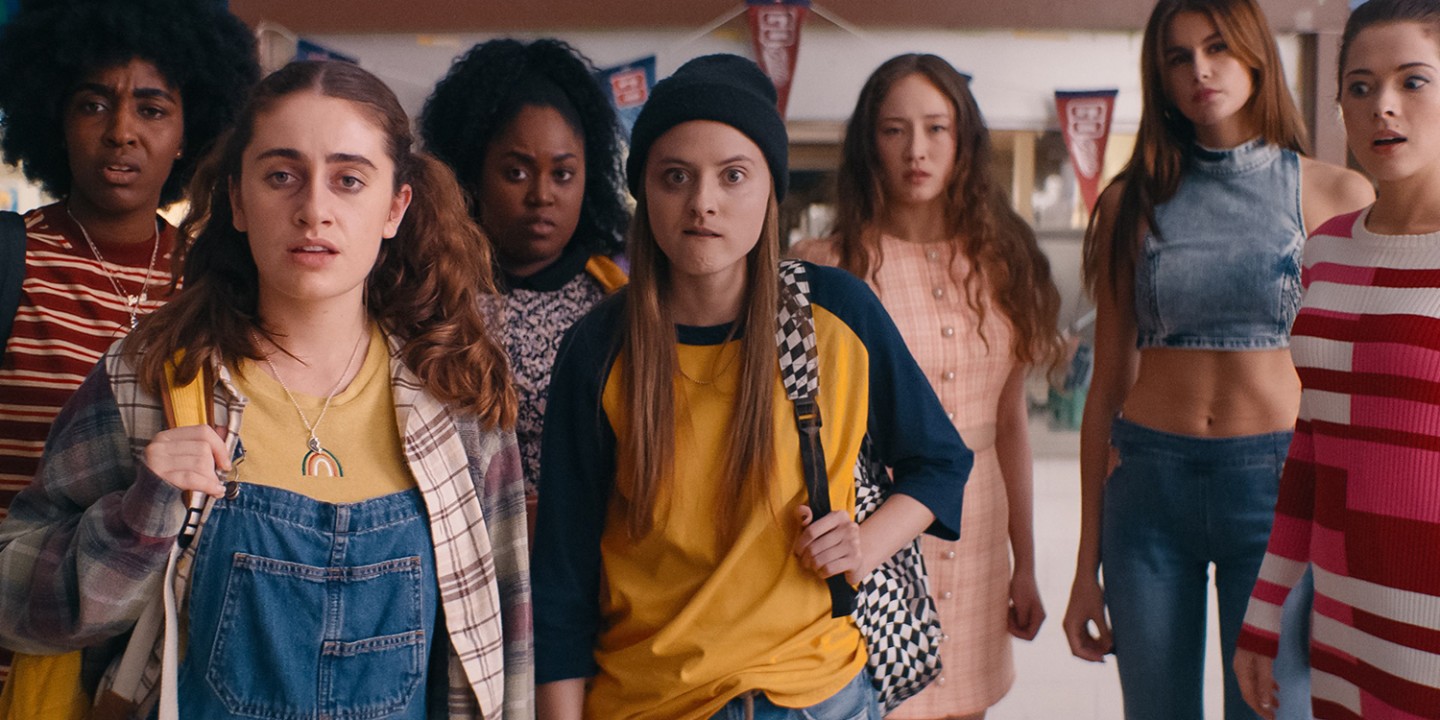Teen comedies for a sex-positive generation
In the raunchy high school comedies of my youth, sex was a forbidden land. Not in Sex Education and Bottoms.

The cast of Bottoms (courtesy of Orion Pictures)
Having just blown it with her high school crush, Josie (Ayo Edebiri) imagines a future in which she never finds a woman to love, she gets knocked up by a closeted gay man, she is forced to join a church where her gay husband will become the pastor (“sure, his sermons are good, but everyone knows he’s fruity”), their son hates them for their dishonest lives, and she is lonely and alone. It is a tour de force monologue that sets the stage for the wild, raunchy energy of Bottoms (directed by Emma Seligman).
Bottoms leans heavily into the tropes of the quirky high school comedy, in which kids pegged as nerdy losers somehow invert the social hierarchy of high school or at least offer a way out of its terrorizing grip. The structure of this plot device is so well developed in popular culture that it took almost half the movie for me to realize how over the top Bottoms is. The football players wear their uniforms everywhere they go. The school is plastered in posters elevating the quarterback to a semi-divine status. (“He might be watching you right now,” the posters declare.) Adult authority figures are at best checked out and at worst verbally abusive.
Read our latest issue or browse back issues.
The satire is thick and obvious: any culture that prizes hypermasculine sexualized violence is going to get a world built in that image. Everyone, football players and dorky lesbians alike, lusts after the pretty, popular cheerleaders, and everyone talks about sex in violent, possessive terms. When a rumor leads to the nerds being mistaken for juvenile delinquents, they decide to translate their street cred into currency in the high school popularity market. Under the auspices of self defense, they start a fight club for girls. The fight club morphs from a funny gag into a deadly serious endeavor, and by the third act we have left reality entirely behind for an increasingly absurd parable of bloodlust and moral redemption.
Bottoms feels like a mashup of violent cartoons, TikTok gags, and YouTube sketches, all peppered with comedic zingers. When I tried to watch it as a realistic coming-of-age story, I was confused and even a little repulsed. But there is a cult-classic-in-the-making vibe to the entire project that kept pulling me in, and the more I gave myself over to its absurd fairy tale qualities, the more I found myself seduced by its rambunctious energy.
Then again, I will give just about any version of the quirky high school comedy genre a chance. I love them, surely in part because I was one of those quirky, loser kids, an ex-homeschooled evangelical who was discovering a love of theater and a penchant for talking too much in class. The genre is built on the revelation that there is a wider, more wonderful world than the preening, self-aggrandizing world of high school popularity. We can watch and laugh from the morally comforting position of those who survived the gauntlet and hope to assert, after the fact at least, that none of that nonsense mattered to us anyway. Probably because we want to imagine that if we could see past it in high school, we can see past it in adulthood too.
I came to Bottoms straight from the fourth season of Sex Education (created by Laurie Nunn; now on Netflix). The same hierarchies of cool are all there, with some British modifications. Our nerdy protagonist Otis Miburn (Asa Butterfield) discovers he has a knack for helping his peers work through their sex and relationship woes, channeling all the pep talks and therapy advice he’s heard from his sex therapist mom (Gillian Anderson) for years.
There is a lot of awkward, often hilarious, always explicit sex in this show, so depending on your own attitudes toward adolescent sex education, you might or might not decide that it is something to watch with a high schooler in your life. Like many high school comedies, it takes for granted that sex is the primary obsession of the teenage years: thinking about it, doing it, wishing you were doing it. But unlike the raunchy teenage comedies of my youth, sex isn’t a forbidden land policed by sexist double standards where the best a teen can hope for is access to some dad’s hidden Playboy magazines and some alcohol-induced groping. The teens in Sex Education have access to a panoply of porn and a whole internet of sex positivity.
It turns out knowing a lot about sex and being able to talk about it unabashedly don’t always make it easier to do. In fact, the show’s deepest insight is that once freed from the ideology of sexual purity, the teens can do the much harder work of figuring out intimacy, self-knowledge, and care. The characters are confused and frustrated, but ultimately so much wiser than I could ever imagine being at 16.
Comparing the show to Bottoms, however, made me wonder if I had been suckered into a middle-aged fantasy of teenage sex positivity. Sex Education is so earnest it feels like the wish fulfillment of a much older adult imagining what high school could be like if all the teens had the wisdom of the show’s middle-aged creators. The characters in Bottoms are nowhere near as wise, thoughtful, or self-aware as the idealized nerdy protagonist of an adult fantasy. Maybe this is because the creators of the film haven't turned 30 yet; maybe it is because they resist a fully realized moral vision. The movie ends with an apology, a promise to try harder, and hints of romantic closure. Oh, and a whole lot of blood. It is bizarre, unfinished, and not entirely rational. Kind of like real adolescence.







